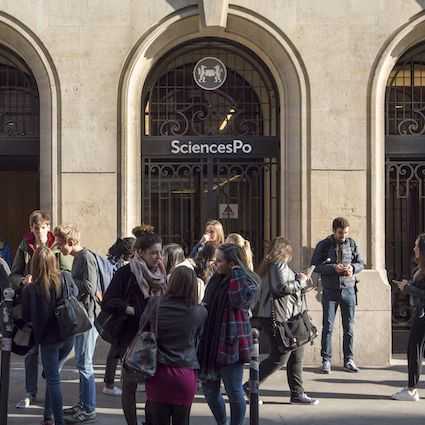
Home>Careers>Career Opportunities>Urban and regional planning
Career opportunities in the urban and regional planning sector after a Master’s degree

The aim of the Sciences Po Urban School’s Master’s programmes is to prepare students for careers in urban planning, regional development, and real estate, in the public, private or nonprofit sectors.
Skills acquired after a Master’s in urban planning at Sciences Po
The Master’s programmes offered by the Sciences Po Urban School enable students to develop the following professional skills:
- Anticipate the impacts of environmental, digital, social, and societal transitions in developing and implementing planning and real estate strategies
- Decipher the strategies of the various stakeholders in the planning and real estate value chain
- Detect opportunities for change so as to adapt projects to the specificities of each city or region
- Master design and design support tools
- Develop and support complex projects
- Organise cooperative tasks, mobilise and facilitate partnerships around a project
- Plan project resources (human, technical, financial)
- Analyse and evaluate public policies
> Find out more about the Urban School’s Masters programmes.
Professional fields in the urban planning and regional development sector
On completion of the Master’s programmes, the knowledge and skills acquired open up career opportunities in various fields:
- Public planning agencies (Établissements publics d'aménagement - EPA)
- Public real estate development agencies (Établissements publics fonciers et d'aménagement - EPFA)
- Regional planning agencies (Établissements publics territoriaux - EPT)
- Councils
- Ministries
- Regional Directorates for the Environment, Planning and Housing (Directions régionales de l'Environnement, de l'Aménagement et du Logement - DREAL)
- Architecture, planning and environment advice agencies (Conseils d’architecture, d’urbanisme et de l’environnement - CAUE)
- Architectural firms
- Economic development agencies
- Urban planning agencies
- Consulting firms
- Design and engineering firms
- Real estate developers
- Land developers
- Services companies
- NGOs
- Nonprofits
- Donors
Jobs and professions after a Master in urban planning
An Urban School Master’s degree allows graduates to work in a wide range of professional environments, in the public or private sectors.
The training opens the door to a variety of professions for a career in areas related to urban and regional planning:
- Project leader in an agency
- Research and planning officer
- Policy officer, social and solidarity economy
- Policy officer, small towns of the future
- Real estate operations manager
- Real estate development officer
- Research engineer
- Urban planner
- Developer
- Regional development project manager
- Real estate project manager
- Assistant to contracting authorities
- Contracting authority support and engineering firms
- Property and economic strategy manager
- Urban renewal project manager
- Strategy/organisation consultant
- Architectural programmer
Testimonies
Guillaume SARAF, graduated 2000, head of real estate and logistics at the University of Lille
> Read the testimonial of Guillaume Saraf
Cécile Ivanovsky, graduated 2017, project manager for prison and justice projects at APIJ
Examples of institutions and companies in the urban planning and regional development sector
Many of our graduates go on to senior positions in companies, organisations and institutions in the urban planning, regional development, and real estate sector.
Here are some examples of institutions and companies that may be of interest to urban planning students:
Public sector
French National Urban Renewal Agency (Agence nationale pour la rénovation urbaine - ANRU) - French National Housing Agency (Agence nationale de l'habitat - ANAH) - Grand Paris Aménagement - National Network of Developers (Réseau national des aménageurs - RNA) - Société du Grand Paris - Ministry of Ecological Transition - EPA Paris-Saclay - Public Agency for Justice Real Estate (Agence publique pour l'immobilier de la justice - APIJ) - CAUE 16 - CAUE de l’Allier - Île-de-France Public Real Estate Agency (Établissement public foncier d'Île-de-France) - Paris Sud Aménagement - Sadev 94 - Paris La Défense - Epamern - Epaurife
Companies
FPI - Gecina - Nexity - AREP - Altarea Cogedim - Bouygues Immobilier - ENGIE - RATP - SNCF - Suez - Véolia - Vinci - SCET
Agencies
L’effet urbain - CoBe, Groupe Huit - Institut Paris Région - Urban planning agency of the Mulhouse region - Anyoji Beltrando - Base - Devillers - Development and urban planning agency of Lille Metropolis - 6t - Alphaville - Bérénice - City Linked - Egis Conseil - Transamo - Une autre ville - Une fabrique de la ville - Le sens de la Ville - Agence 360 - Alphaville - Attitudes Urbaines
NGOs & nonprofits
Apur - Paris Urbanism Agency - Habitat-Cité - Urbanistes du monde - Aperau - AMARIS
International institutions / international donors
Agence Française de Développement (AFD) - European Investment Bank (EIB) - Deutsche Gesellschaft für Internationale Zusammenarbeit (GTZ) - Japan International Cooperation Agency (JICA) - Inter-American Development Bank (IDB) - CAF
Key figures
400
students
31%
are international students
35 to 80
students per programme for individual support and personalised study pathways
1
study trips per Master, in France and abroad
91%
of students find a job before or within 6 months of graduation
30 to 80
students per programme, allowing a highly personalised training
124
professors, researchers and teachers from the corporate world



